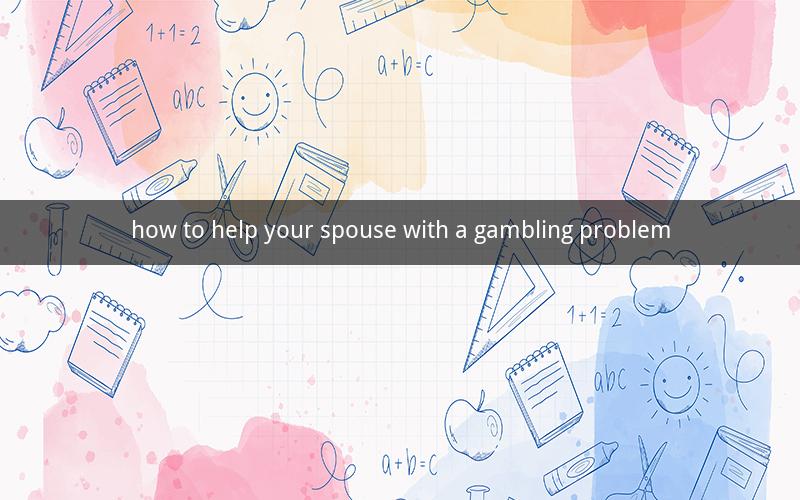
How to Help Your Spouse with a Gambling Problem
Table of Contents
1. Understanding the Problem
2. Communicating with Your Spouse
3. Seeking Professional Help
4. Setting Boundaries
5. Financial Management
6. Supporting Their Recovery
7. Building a Support System
8. Taking Care of Yourself
9. Encouraging Change
10. Dealing with Relapse
1. Understanding the Problem
The first step in helping your spouse with a gambling problem is to understand the nature of the addiction. Gambling addiction is a chronic condition characterized by an inability to control gambling behavior, leading to significant negative consequences in various aspects of life, including financial, emotional, and relational.
2. Communicating with Your Spouse
Open and honest communication is crucial in addressing your spouse's gambling problem. Create a safe and non-judgmental environment where they feel comfortable sharing their feelings and struggles. Listen actively, without interrupting, and acknowledge their feelings. Avoid confrontational language and focus on expressing your concerns without placing blame.
3. Seeking Professional Help
Encourage your spouse to seek professional help from a therapist or counselor specializing in gambling addiction. A professional can provide personalized guidance and support, helping your spouse develop strategies to overcome their addiction.
4. Setting Boundaries
Establish clear boundaries to protect yourself and your family from the negative consequences of your spouse's gambling. This may include limiting access to gambling sites, setting financial boundaries, and enforcing consequences for non-compliance.
5. Financial Management
Assess the financial impact of your spouse's gambling and develop a plan to manage and resolve any debts. This may involve seeking financial counseling, negotiating with creditors, and creating a budget to prevent future financial strain.
6. Supporting Their Recovery
Support your spouse's recovery process by being present and supportive throughout their journey. Attend support groups or counseling sessions together, and encourage them to participate in activities that promote healthy habits and reduce the temptation to gamble.
7. Building a Support System
Encourage your spouse to build a support system of friends, family, and fellow recovering gamblers. A strong support network can provide emotional support, share experiences, and offer practical advice during challenging times.
8. Taking Care of Yourself
It's essential to take care of yourself while supporting your spouse through their addiction. Seek support from friends, family, or support groups for individuals affected by a loved one's gambling problem. Engage in self-care activities to maintain your mental and physical health.
9. Encouraging Change
Encourage your spouse to make positive changes in their life, such as adopting healthy habits, pursuing hobbies, and developing new social connections. Celebrate small victories and milestones to foster a sense of accomplishment and motivation.
10. Dealing with Relapse
Relapse is a common part of the recovery process. If your spouse experiences a relapse, remain supportive and focus on their efforts to overcome the setback. Discuss the relapse with a professional to identify underlying issues and develop strategies to prevent future relapses.
FAQs
Q1: How can I tell if my spouse has a gambling problem?
A1: Look for signs such as secretive behavior, financial strain, missing work or social events, and an increasing amount of time spent on gambling activities.
Q2: Should I confront my spouse about their gambling problem?
A2: Yes, confront them in a non-judgmental and supportive manner. Express your concerns and offer your help without placing blame.
Q3: Can I force my spouse to seek help for their gambling addiction?
A3: No, you cannot force someone to seek help. However, you can encourage and support them in their decision to seek professional assistance.
Q4: How can I help my spouse manage their finances during their recovery?
A4: Work together to create a budget, seek financial counseling, and address any existing debts. Monitor their spending habits and provide support as needed.
Q5: Is it normal for my spouse to relapse during their recovery?
A5: Yes, relapse is a common part of the recovery process. Encourage your spouse to seek support and learn from their experiences to prevent future relapses.
Q6: How can I support my spouse's recovery without neglecting my own needs?
A6: Seek support from friends, family, or support groups for individuals affected by a loved one's gambling problem. Engage in self-care activities to maintain your mental and physical health.
Q7: Can my spouse's gambling addiction affect our children?
A7: Yes, your spouse's gambling addiction can have a significant impact on your children, including emotional and financial consequences. Encourage open communication and seek support for your children if needed.
Q8: What can I do if my spouse's gambling addiction is causing domestic violence?
A8: Seek help immediately. Contact a domestic violence hotline or a local domestic violence shelter for assistance and support.
Q9: How long does it take for someone to recover from a gambling addiction?
A9: Recovery from a gambling addiction varies from person to person. Some individuals may experience immediate improvement, while others may require ongoing support and treatment.
Q10: Can I still have a healthy relationship with my spouse if they have a gambling addiction?
A10: Yes, it's possible to have a healthy relationship with your spouse, even if they have a gambling addiction. Focus on open communication, mutual respect, and support throughout their recovery process.